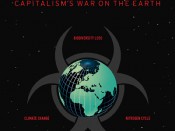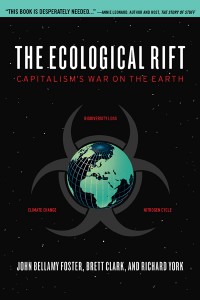“Crossing the River of Fire: The Liberal Attack on Naomi Klein and This Changes Everything” [PDF] (coauthored with Brett Clark, Foster listed first) Monthly Review, vol. 66, no. 9 (February 2015), pp. 1-17. DOI: 10.14452/MR-066-09-2015-02_1
Naomi Klein’s new book, This Changes Everything [argues that the source of the looming crisis from climate change] is not the planet, which operates according to natural laws, but rather the economic and social system in which we live, which treats natural limits as mere barriers to surmount. It is now doing so on a planetary scale, destroying in the process the earth as a place of human habitation.… In the age of climate change, Klein argues, a system based on ever-expanding capital accumulation and exponential economic growth is no longer compatible with human well-being and progress—or even with human survival over the long run.… In this way Klein…signals that she has now, in William Morris’s famous metaphor, crossed “the river of fire” to become a critic of capital as a system.… [This] has led to a host of liberal attacks on This Changes Everything, often couched as criticisms emanating from the left. These establishment criticisms of her work, we will demonstrate, are disingenuous, having little to do with serious confrontation with her analysis. Rather, their primary purpose is to rein in her ideas, bringing them into conformity with received opinion. If that should prove impossible, the next step is to exclude her ideas from the conversation.
Translations:
- Spanish translation in Noticas de Abajo, June 14, 2015.


